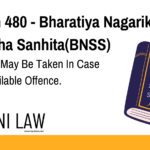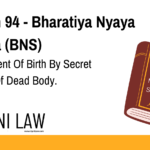Code: Section 87 – Bharatiya Sakshya Adhiniyam, 2023
The Court shall presume, unless contrary is proved, that the information listed in
an Electronic Signature Certificate is correct, except for information specified as subscriber
information which has not been verified, if the certificate was accepted by the subscriber.
Explanation of Section 87 BSA
Section 87 of the Bharatiya Sakshya Adhiniyam (BSA) deals with the presumption regarding the accuracy of the information listed in an Electronic Signature Certificate (ESC). The key provisions of this section are:
-
Presumption of Accuracy:
-
The court presumes that the information contained in an ESC is correct, unless proven otherwise. This presumption applies unless the information is explicitly marked as “subscriber information” that has not been verified.
-
-
Scope of Verification:
-
The presumption only applies to the information in the certificate, excluding any subscriber-specific details that have not been verified. If such details have not been verified, they cannot be presumed to be accurate.
-
-
Acceptance by Subscriber:
-
The presumption applies provided the certificate was accepted by the subscriber. In other words, the certificate must be issued and endorsed by the subscriber for the presumption to hold.
-
This section aims to streamline the process of verifying the accuracy of electronic signature certificates in legal proceedings, ensuring that they are considered valid unless explicitly challenged.
Illustration
Example 1: Validity of Electronic Signature Certificate in a Contract Dispute
A party to a contract presents an Electronic Signature Certificate as evidence. The court presumes that the information in the certificate is correct, except for the unverified subscriber information, as long as the certificate was accepted by the subscriber.
Example 2: Challenge of Subscriber Information
A party in a dispute contests the accuracy of certain details in the ESC. The court will review whether the subscriber’s information has been verified. If it hasn’t, it cannot be presumed accurate under Section 87.
Common Questions and Answers on Section 87 BSA
1. What information does Section 87 presume to be correct?
Section 87 presumes that all information listed in an Electronic Signature Certificate is correct, except for unverified subscriber-specific information.
2. Can the presumption of accuracy be challenged?
Yes. If there is evidence to the contrary, the presumption can be contested in court. The party challenging the certificate would need to prove the inaccuracy of the information.
3. What does “subscriber information” mean in this context?
Subscriber information refers to the details specific to the person or entity who is subscribing to the Electronic Signature Certificate. If these details have not been verified, the court does not presume them to be accurate.
4. Does this section apply to all Electronic Signature Certificates?
Yes, Section 87 applies to any Electronic Signature Certificate, provided the certificate was accepted by the subscriber and follows the requirements laid out by the BSA.
5. How does this presumption affect legal proceedings?
The presumption simplifies the process of accepting electronic signature certificates as valid, reducing the need for extensive verification unless evidence indicates otherwise.
Conclusion
Section 87 of the Bharatiya Sakshya Adhiniyam (BSA) provides a presumption of the correctness of the information in Electronic Signature Certificates, making it easier to rely on these certificates in legal proceedings. However, the presumption does not extend to unverified subscriber-specific details, which must be proven accurate to hold validity in court.
For more detailed insights into digital signatures and electronic records, visit ApniLaw.













